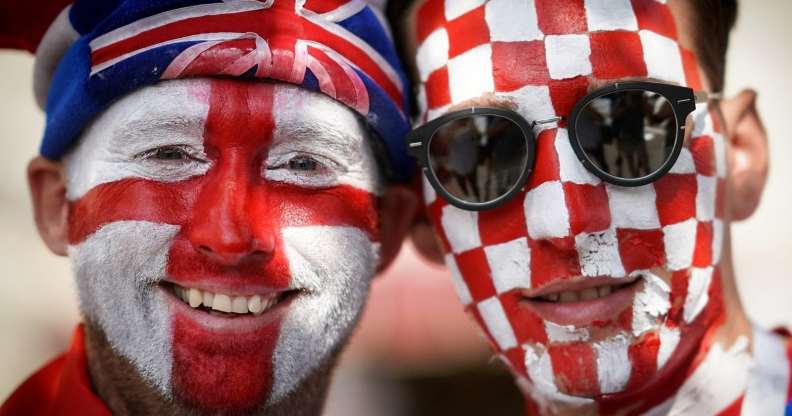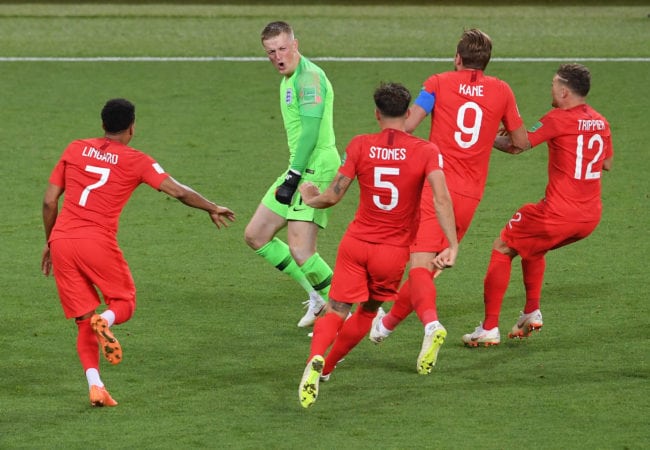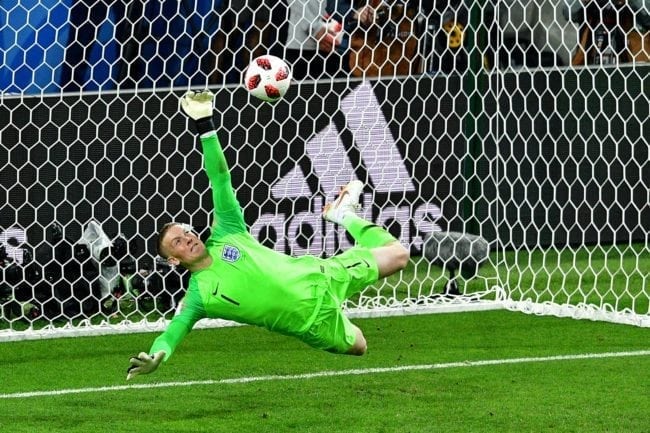The LGBT guide to who should win the England vs Croatia match tonight

MOSCOW, RUSSIA – JULY 11: An England and a Croatian football fan pose in Red Square ahead of tonight’s World Cup semi-final game between England and Croatia on July 11, 2018 in Moscow, Russia. (Photo by Christopher Furlong/Getty Images)
If tonight’s World Cup semi-final was based on LGBT+ rights alone, England would narrowly beat Croatia.
For the first time in 28 years, England has made it to the World Cup semi-final, where the three lions will take on Croatia.
The match will no-doubt be tough, with Croatia proving their worth in a dramatic three-nil victory over Argentina in the group stages.
But, which country wins on LGBT+ rights? Here’s a brief guide.
Equal Marriage
England legalised equal marriage under the Conservative government back in 2013. Same-sex couples in the UK can also get their relationship legally recognised with a civil partnership, giving them essentially the same rights as those in civil marriages. Civil partnerships have been legal since 2005.
Croatia, on the other hand, has not yet legalised same-sex marriage. In fact, equal marriage was constitutionally banned in the country following a referendum in 2013. However, same-sex couples in Croatia have had their relationships legally recognised since 2003. In 2014, the Croatian government introduced the Life Partnership act, granting same-sex couples the same rights as their heterosexual married counterparts, except for the right to adopt children.
Verdict: England 1-0 Croatia.
Same-sex adoption
Same-sex couples in England have been able to adopt children since 2005.
In Croatia, however, same-sex adoption is not legal. But couples in same-sex relationships can become a “partner-guardian” of their life partner’s child, and single people can adopt regardless of their sexual orientation.
Verdict: England 2-0 Croatia.
Discrimination
England banned all forms of discrimination based on sexual orientation and gender identity under the Equality Act 2010, but there had been some protections for sexuality since 2003, and since 1999 for gender identity. Still, a lot of damage was done under Section 28, which banned schools and councils from “promoting” homosexual relationships. This legal clause was finally repealed across the whole of the UK in 2003, but one ex-teacher, who taught under Section 28, told PinkNews this year that the “shadow of Section 28 is very long.”
Croatia introduced some protections for discrimination based on sexuality and gender identity back in 2003, and introduced full protections in 2008.
Verdict: England 2-1 Croatia.

the right to change gender
Transgender people been able to change their legal gender since 2005 in England. The government is also set to review the 2004 Gender Recognition Act, putting out the consultation earlier this month, in order to make it less bureaucratic. The current legislation has been criticised for being too complicated and time consuming. Also, before the introduction of equal marriage in 2013, some people who wanted to change gender were forced to divorce or annul their marriages, because same-sex marriage wasn’t legal.
People in Croatia can also legally change their gender. Since June 2013, transgender people have no longer had to state their change of gender on their birth certificate, which was previously a legal requirement.
Verdict: England 3-2 Croatia.
The legalisation of homosexuality
Homosexuality has always been legal for women in England, and consensual sex acts between men above 21 in private have been legal since 1967.
Same-sex sexual activity has been allowed in Croatia since 1977, when the country’s penal code was introduced.
Verdict: England 4-2 Croatia.

England’s Jordan Pickford saves a penalty kicked by Colombia’s forward Carlos Bacca in the last sixteen. (MLADEN ANTONOV/AFP/Getty Images)
Age of consent
The age of consent was finally equalised in England in 2001, permitting gay sex from the age of 16.
In Croatia, the age of consent – set at 15 years-old – was equalised for LGBT+ people back in 1998.
Verdict: England 4-3 Croatia.
The winner?
England, then, would narrowly beat Croatia if the match was based on LGBT+ rights. The three lions defeat the Croatians on two key areas: equal marriage and same-sex adoption. Still, with LGBT+ rights unlikely to play a part in tonight’s game, only time will tell…

